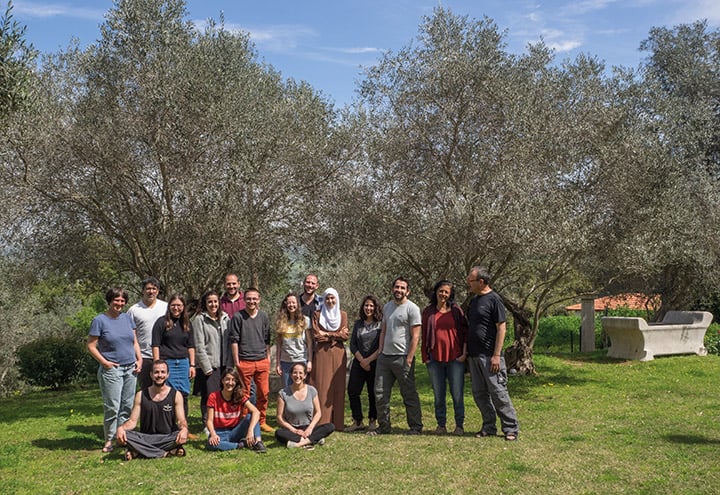Keywords:
The COVID-19 pandemic has required an unprecedented level of collaboration within the scientific community, as labs around the world aim to characterize and understand the SARS-CoV-2 virus in order to develop and implement new diagnostic tests, therapeutics and vaccines. This cooperative approach has led to some unexpected partnerships, as techniques and knowhow from across numerous disciplines are brought together to accelerate research and testing activities. Professor Nir Friedman’s team at the Hebrew University of Jerusalem has been at the center of one such situation, using its knowledge of workflow automation from investigating yeast genomics to develop a novel large-scale sequencing-based assay for the detection of SARS-CoV-2.
The research conducted by Professor Nir Friedman’s team at the Hebrew University of Jerusalem is normally focused on investigating the transcription machinery of eukaryotes, however, the group has recently found itself at the forefront of efforts to develop a straightforward molecular diagnostics workflow for COVID-19 testing in Israel. Researcher Dr Ayelet Rahat explained: “Our normal activities have nothing to do with diagnostics or coronaviruses; we primarily use yeast as a model organism to look at the various molecules associated with chromatin and transcription, such as histones and promoters.” “The lab is a mix of molecular and computational biologists, so we tend to run large-scale analyses, screening thousands of strains of yeast for many studies. Automation is obviously well suited to this work, and we have been using a Freedom EVO® workstation for over 10 years. Our unique instrument configuration also includes a microplate reader, a FACS analyzer and an automated fluorescence microscope, all fully integrated with the Tecan platform to provide completely automated data acquisition. We were originally using this set-up in combination with an extensive library of fluorescently-labeled knock out yeasts, but have more recently started to use DNA-Seq, RNA-Seq and ChIP-Seq techniques to gain an even deeper understanding. The Freedom EVO platform allows us to perform these studies on a large scale – keeping the lab’s computational biologists happy – by providing fast and efficient nucleic acid extraction.”

Professor Friedman’s group at the University of Jerusalem (NOTE: Photo taken prior to social distancing)
“When the COVID-19 pandemic spread across the globe, it was this experience of high throughput nucleic acid processing that became crucial. We were in the process of shutting down the lab to comply with Israeli government advice, when we received a call from the Hadassah Medical Center, which operates two large university hospitals in West Jerusalem. They were having trouble sourcing commercial RNA extraction kits to perform RT-qPCR-based diagnostic testing, and wanted our help in developing a generic diagnostic protocol suitable for high throughput. Although this seemed a long way from our yeast work, we obviously agreed to help.”
This highlighted how important local support is for laboratory automation.
“We initially attempted to create an RNA extraction protocol using filter plates and a vacuum system, but this proved unsuitable for the kind of throughput we were trying to achieve. One of the PhD students in the lab, Alon Chappelboim, suggested adapting ideas from the barcoded beads technology we were already using for single cell RNA-Seq. This approach allows us to capture viral RNA in individual patient samples, then release the barcoded RNA from the beads, pool the samples together for RT-PCR, sequence the pooled samples, and use the barcodes to link the results back to individual patients. This protocol – developed in association with Dr Naomi Habib’s lab from the Edmond and Lily Safra Center for Brain Sciences at the university – is still under development. However, the first step of viral RNA capture on magnetic beads could replace commercial RNA extraction protocols and this, followed by the conventional RT-qPCR test, will give an immediate solution to the diagnostics laboratory in the hospital.”
“We originally chose the Tecan instrument due to a combination of its flexibility – allowing us to integrate various analytical devices onto the platform – and the excellent support provided by Tecan’s local distributor Neotec Bio, and both of these factors have been very important for this project. Dr Moshe Cohen from Neotec has been instrumental in helping us to develop the new workflow, offering technical support and advice. For example, we were used to working in small sample volumes, and so initially developed the protocol to work with 30 to 35 microliters of samples. However, this led to a relatively high limit of detection, meaning that patients with very low viral titers were at risk of receiving false negative results. Moshe suggested we switch to deep-well plates, allowing us to move to larger sample volumes. We had no experience with these plates, but he helped us to adapt the protocol and instrument settings very quickly to accommodate the new format, and this highlighted how important local support is for laboratory automation. We also had help from a number of other local scientists to optimize and refine the workflow – it was a real team effort.” “One of the most important aspects of this workflow – which has already been published* – is that it does not require bespoke reagents. Once you have purchased the paramagnetic beads, you simply run the protocols using buffers that are easy to make in any lab. This is crucial in a pandemic situation, where there is unprecedented demand on supply chains, and commercial extraction kits may not be readily available. We are very pleased to have been able to contribute, however unexpectedly, to the efforts to fight the pandemic, and have also gained experience and capabilities from this project that will benefit our routine research activities going forward,” Ayelet concluded.
*Sars-CoV2 RNA purification with homemade SPRI beads for RT-qPCR test www.protocols.io/view/sars-cov2-rna-purification-with-homemade-spri-bead-beswjefe
To find out more about Tecan’s nucleic acid purification solutions, visit www.tecan.com/nap
To have a closer look at the robotic set-up at Professor Friedman’s lab, go to http://systemsbio.cs/Friedmans_Lab/Robotic_ Facility.html
Keywords:









